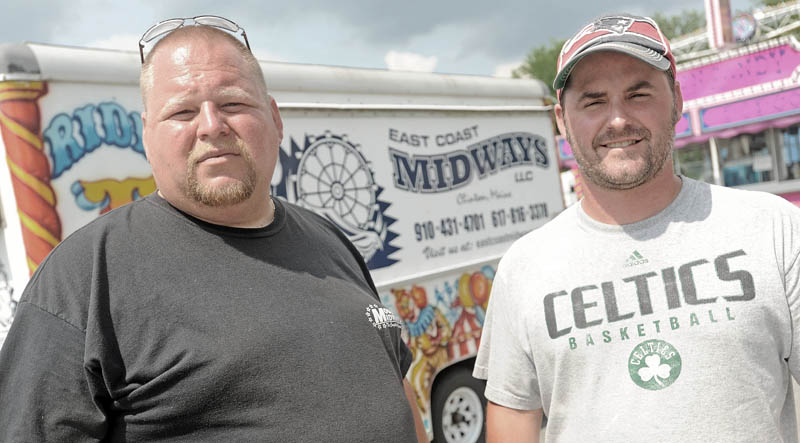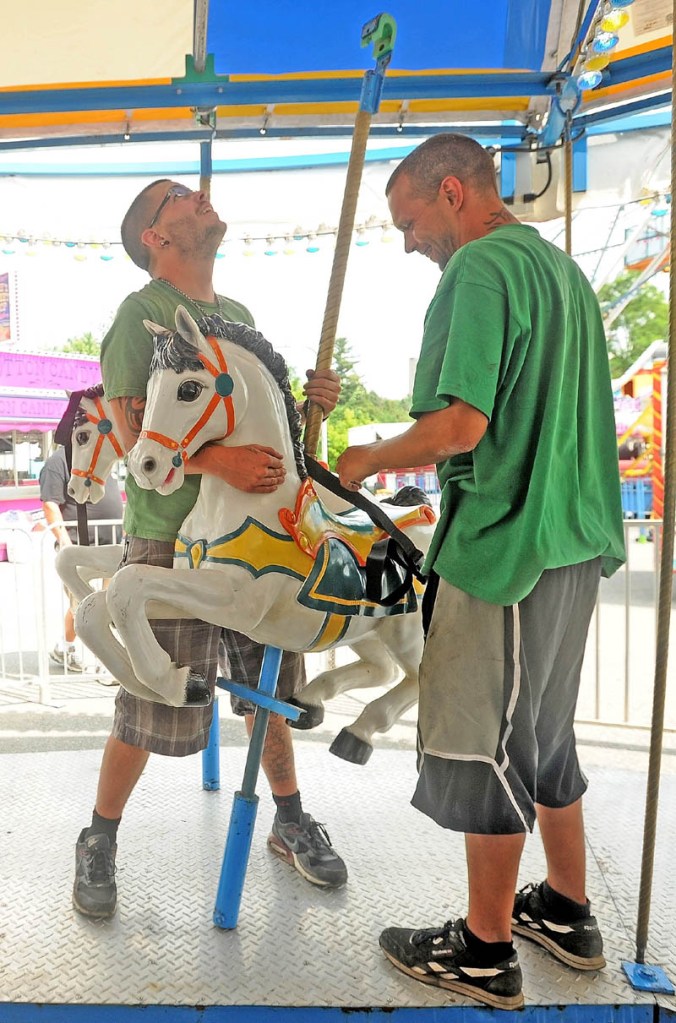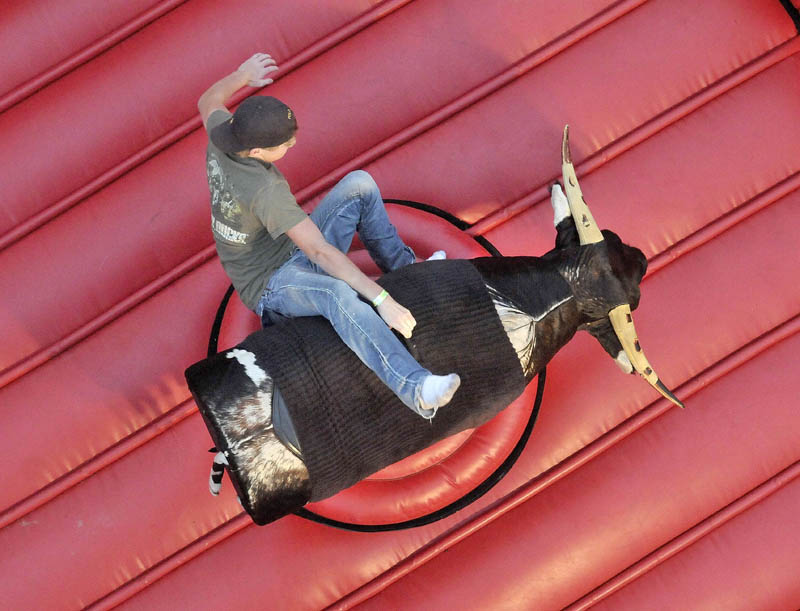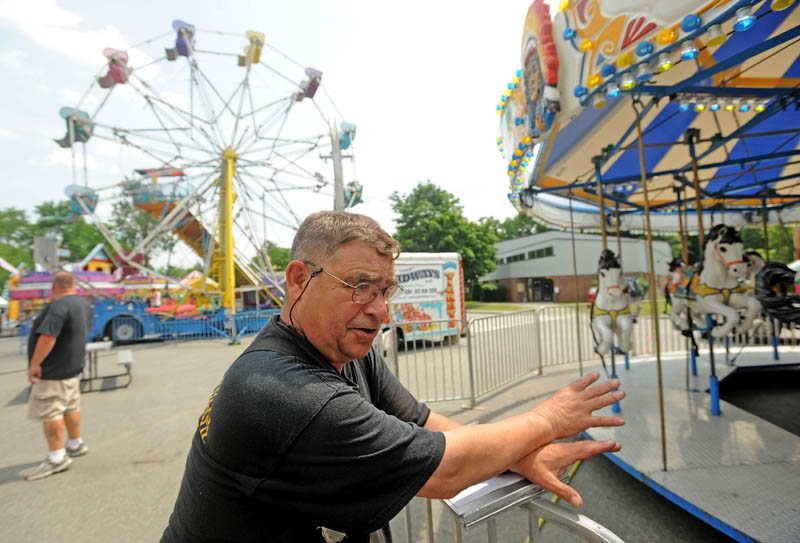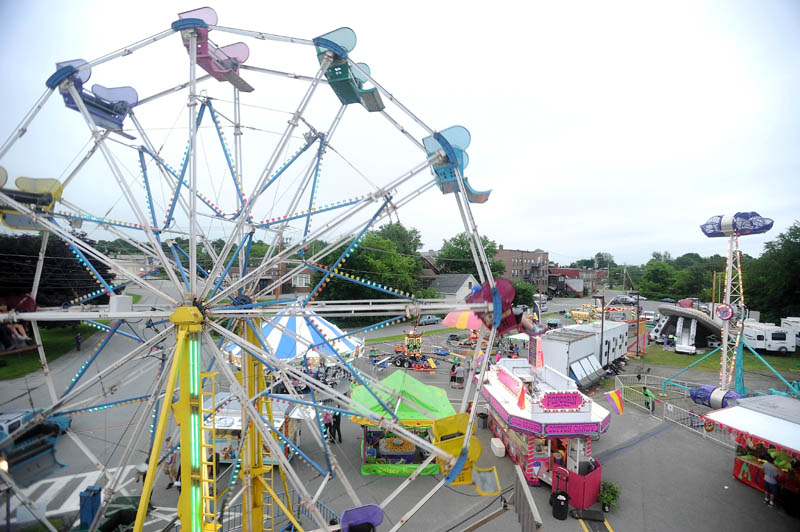The carnival industry isn’t a business that someone just decides to get into. Sure, it may sound fun, owning all those games and rides, snacking on nothing but corn dogs and candied apples, but the idea of hauling those giant rides and working long, hot summer weeks while almost everyone else is relaxing on vacation or at the town fair can be exhausting and challenging.
It’s that challenge that Billy Swafford loves about his business. Swafford, who is co-owner of East Coast Midways in Clinton, grew up in the carnival business before starting his company three years ago.
“I just love it,” Swafford said on a hot, sticky Monday in Fairfield as he and his crew worked throughout the day to set up for the Fairfield Days celebration.
“I love pulling into the town and meeting new people. We dealt with country folks last week. Before that we were in Philadelphia,” he said. “It’s really the challenge of constantly being on the move. The new challenge is what I love.”
Swafford, 33, has faced a variety of challenges throughout his business venture, whether it be the issues that come with being a start-up in an old-fashioned industry, working with a variety of safety regulations that change with the location or dealing with the stigma that comes with the carnival industry.
It’s ‘in your blood’
Swafford has been around the carnival industry since he can remember. His parents owned an independent company that he helped with in Rhode Island.
Independents have a small number of rides, games and food. Large carnival companies and smaller fairs can contract with independents to provide the bigger fairs with more options.
“I would set up rides, I would grease equipment, I would set up all the toys on the walls. Anything my parents needed, I’d be right there,” Swafford said. “I’d travel all summer long and I’d work. Something like this is in your blood. You’re born into it.”
Swafford said he was 13 when he stopped looking at carnivals as amusement and began looking at it as a career. It was also around this time that Swafford met his business partner and best friend, Faron Young.
Young’s sister worked at the same carnival that Swafford’s family worked at. Throughout his teenage years, Swafford saved money until he eventually started his own independent service in North Carolina, where he and his family had moved. Young also started an independent service in Massachusetts.
“Basically, he had his business and I had mine,” Swafford said. “We both had games and I had food. Up until two years ago, all the food and games at the Clinton Fair were ours.”
In 2009, Swafford met Clinton resident Denzie Dorr at the fair and moved his independent business to Clinton the next year. He continued to store his games and trucks at Young’s mother-in-law’s property in Connecticut — where they had a building to shield it from the elements — while they ran their services throughout New England.
Soon afterward, Swafford and Young were joking around one day, talking about buying a ride or two and starting their own full carnival service. After a couple of months of floating the idea around, Swafford was on a plane to Wisconsin to buy the duo’s first ride — the Alpine Funhouse.
“We sold some of our games to purchase our first rides,” Young said. “It just kind of happened.”
Swafford and Young have invested heavily in East Coast Midways since they started the company in 2010.
“We used a lot of savings. We financed a lot,” Swafford said. “We’re probably in excess of a million dollars in debt for the equipment.”
Even so, the company has expanded each of its first three years. It jumped from five to nine rides in its second off-season before buying six more last winter with plans to add another five or six this winter.
“Right now, we have about $30,000 a month in ride payments six months of the year,” Swafford said. “Next year that cuts down to about $10,000. A lot of our notes are paid out next year.”
While the first two years Swafford and Young had to promote their company actively, that changed recently.
“Last winter it really started to come together,” Swafford said. “We started to get some phone calls. People in Maryland started calling us. A guy in Florida called us. We just signed the Chesire Fair in New Hampshire (starting next year), which is one of the biggest fairs in New England.”
Still, Swafford said he hopes to start booking more in Maine, since they’re a Maine business.
“We have several Maine fair committees coming out to see us next week in Thomaston,” Swafford said. “They’ll come and look at the equipment and our rides — show them we’re not some ragtag operation.
“They don’t understand that I’m new to East Coast Midways. I’m not new to the industry.”
‘I was too generous’
While still moving the entire business to Clinton, Swafford is finalizing the purchase of 3 acres in Clinton to build a facility that will store all the rides and equipment as well as provide space and technology to repair the equipment.
“The facility will have an electrical shop and paint shop,” Swafford said. “It’s probably looking at $700,000 to build, but Clinton’s going to be the heart of the business. It’s going to be the home of the show. We’re a legitimate Maine corporation.”
While East Coast Midways is close to becoming a full-fledged local carnival business based in Clinton, the annual Clinton Fair voted against contracting the local carnival company, instead choosing Cushing Amusements, of Massachusetts, with which it has contracted for more than 30 years. East Coast Midways tried to earn the contract this past winter.
“They tend to not like change,” Swafford said. “They’ve been with the same show for 36 years. That’s the only thing I can sum it up to be.”
According to Swafford, he offered a larger percentage of his ticket sales than his competitor, offered to pay for the fireworks and was willing to start two scholarships for $2,500 each to benefit local children.
“I offered a lot of money because it is my community,” Swafford said. “They are my neighbors. The Clinton Fair’s motto is ‘A weekend at the fair turns out to be a year of community service.’ I’m a part of their community. They should at least give me the option.”
Fair secretary Buddy Frost, 68, said that while Swafford and East Coast Midways’ pitch was generous, he was worried about whether they’d be able to keep up their end of the contract.
“If he hadn’t offered quite so much, it probably would have been better,” Frost said. “We’ve had Cushing Amusements for so many years, it wouldn’t be fair to leave them.”
Frost did say that the fair committee voted on the decision for the first time in nearly 30 years.
“This was the first year we even considered someone else,” Frost said.
Frost said he’s going to keep an eye on East Coast Midways and won’t rule out contracting the company in the future.
“I would prefer it to be someone from in-state,” Frost said.
‘Industry earned a stereotype’
The carnival industry is often stigmatized in pop culture as a business for the uneducated and unsightly. Drug abusers and sketchy dealings are often associated with carnivals.
“You get the people that think we’re scum,” Swafford said, “but I ignore it. It’s ignorance on their part. All of our employees are drug-tested. We do background checks on all of them.”
Swafford said the industry has changed drastically since he was a kid greasing the merry-go-round. Besides increased regulations and an abundance of entertainment sources for today’s youth, the largest issue concerning the carnival industry is the fluctuating economy.
“Back in the day, when the economy would start to go downhill, carnivals would always do better because people wouldn’t take their families on vacation — they’d splurge at the town carnival once a year,” Swafford said. “That doesn’t happen now. People don’t spend like they used to. We’re battling a bad economy. We’re battling fuel prices. But we’re still growing.”
Still, despite the challenges and stereotypes he’s faced with, Swafford still remembers the teenager in himself, in love with the business, waiting for the day he can start his own.
“I’m proud to say I’m in this business,” he said. “It’s a proud business. It’s an honest business. I love it.”
Jesse Scardina — 861-9239
jscardina@mainetoday.com
Send questions/comments to the editors.

